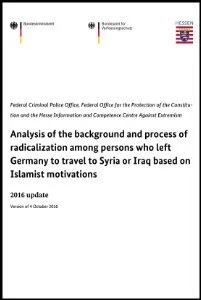Analysis of the background and process of radicalization among persons who left Germany to travel to Syria or Iraq based on Islamist motivations
By Federal Criminal Police Office, Federal Office for the Protection of the Constitution, and Hesse Information and Competence Against Extremism.
The present document is the second update of the analysis of the background and process of radicalization among persons who left Germany to travel to Syria or Iraq based on Islamist motivations. Since the first report in 2014, highly dynamic, geopolitical developments have occurred, leading to major changes in travel movements to the conflict region in Syria and Iraq during the four and a half years under observation (January 2012 to June 2016). A high-water mark in 2014 around the time the “caliphate” was declared in Syria/Iraq was immediately followed by a significant decline in the number of departures; this decline was likely related to the increasing military pressure on the so-called Islamic State (IS). As a result, the conflicts in and around Syria, the founding and attempted expansion of the IS and the fight against this terrorist organization are issues which continue to dominate international and national policy. While the U.S.-led alliance, including Turkey, is focused above all on fighting the IS, the forces of the Syrian regime, with massive support from Russia and Iran, are fighting all actual or alleged Islamist opponents of the regime: both “moderate” Islamists such as the Free Syrian Army and clearly jihadist groupings such as the IS and the al-Qaeda affiliate in Syria, Jabhat Fateh al-Sham (“Front for the Conquest of the Levant”), formerly known as Jabhat al Nusra, or the al-Nusra Front. These efforts have increased in terms of quantity and quality since autumn 2015, with two immediate effects: First, they succeeded in pushing back the IS – the most obviously jihadist opponent of the Assad regime, also perceived internationally as the greatest threat – in both Syria and Iraq, which strengthened the Syrian government. Second, they set off an unprecedented wave of refugees fleeing the conflict region for Europe.
Wiesbaden: Bundeskriminalamt (BKA), 2016. 56p.


